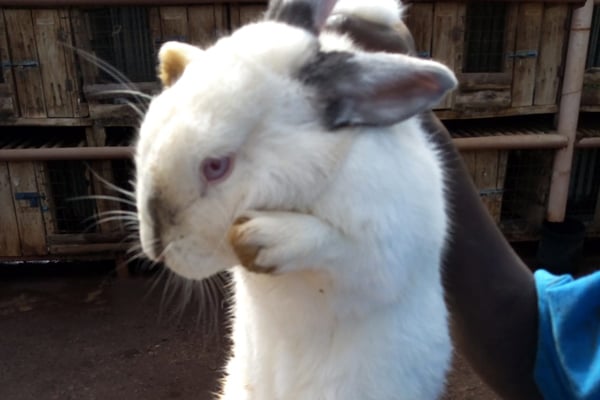Revolutionising rabbit farming: Uganda invests in modern infrastructure

The rabbits, especially the California large white cost about Shs40,000 each and it produces about 8 to 15 kittens per litter.
What you need to know:
- Mr Jacob Aisia, a rabbit farming trainer, stressed the importance of proper care, including removing soiled bedding daily and disinfecting cages weekly.
In a bid to promote rabbit farming and improve market access, the government has embarked on the construction of model farms and abattoirs across the country.
The project, launched in Budaka District on Saturday, aims to build 160 facilities, including stores and houses for rabbits, at a cost of Shs3.9 billion.
The rabbits, especially the California large white cost about Shs40,000 each and it produces about 8 to 15 kittens per litter. The rabbits weigh about 3 kilograms after slaughter.
According to medical experts, rabbit meat has no fats and is medicinal, clearing cancer and pressure in humans.
"The viable way of fighting poverty is through rearing rabbits because they produce monthly and for now, we have a market," said Mr John Okia, Director of El-shadai Rabbit Keeping Uganda Ltd. "We will buy a rabbit for Shs40,000 and provide free houses, feeds, and vaccination to beneficiary farmers."
He explained that the beef and other products including urine and skins from the rabbit will be taken to a multi-billion rabbit beef factory in Butebo District
“This will improve people’s lives and fight the high levels of poverty. We will also construct a free house, provide free feeds, free vaccination to the beneficiary farmers in bid to encourage locals to embrace rabbit rearing,” he said.
Mr Fred Masika, National Veterinary Officer, working with the El-Shadai rabbit keeping project, emphasised the importance of vaccination and proper care for the rabbits.
“Every rabbit at five months must be vaccinated and the company will be buying them after four to five months and the meat will be taken to the company factory for processing,” he said, adding: “Its meat is white and recommended for human consumption because it has no fats and it is also medicinal so that it clears cancer and pressure.”
Farmers like James Kirya are optimistic about the project, saying it will boost household income. However, he emphasises the need for intensive education and sensitisation on rabbit keeping.
Mr Jacob Aisia, a rabbit farming trainer, stressed the importance of proper care, including removing soiled bedding daily and disinfecting cages weekly.
“Rabbits eat, among other things, fruits and vegetables as part of their essential diet. These include apples, blackberries, cherries, carrots, green or red bell peppers, mango, peach, pineapple,” he said, adding that farmers will be further trained in clusters from their respective localities.
With the growing demand for rabbit meat globally, the project is seen as a profitable venture.
Mr Paul Makopa, one of the area councillors, appealed to the locals to embrace the project, saying rabbits are also good for nutrition.
“It has the lowest fat and calories, less sodium content and a high meat-bone ratio,” he said.




